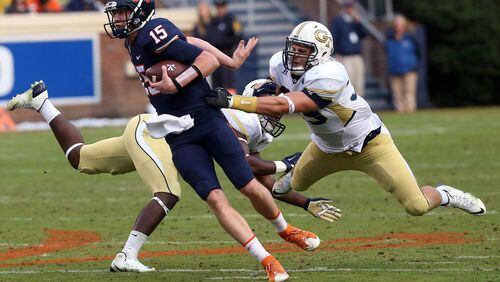The solution to Georgia Tech’s pass-rush challenges may not lie solely with greater attention to down and distance, but the Yellow Jackets are counting on it to make a difference.
Doing a better job of matching pass-rush tactics with down and distance was an emphasis in spring practice, and likely will be again when Tech opens preseason practice Aug. 4.
“I really think we got better at knowing situational football, because a lot of pass-rush situations, you’re on third down,” defensive tackle Patrick Gamble said last week at the ACC Kickoff in Charlotte, N.C. “It’s third-and-3, third-and-4, you’re getting quick-gamed most of the time, so you’ve got to get your hands up.”
“Quick gaming” is a term coach Paul Johnson mentioned on multiple occasions during the spring and again in Charlotte. It’s passes off short dropbacks. Tech was often beaten by it last season. The Jackets had trouble pressuring the quarterback with a standard four-man pass rush, so defensive coordinator Ted Roof blitzed frequently. One answer to blitzes is the quick game, which will deliver the ball to backs or receivers before the blitz can affect the passer and then can exploit a secondary that has been voided of the blitzing defenders.
As Gamble pointed out, an answer to the quick game is anticipating it and, rather than rush the quarterback with the expectation that he’ll take a deep dropback, be ready to bat the ball down.
“I think knowing the situations and what you have to do in certain situations and what move you can execute and when you need to get your hands up helps us out in the game,” he said.
Pass rushing with more overall awareness was a priority of defensive line coach Mike Pelton. Earlier in the summer, he said that in the spring he stressed the elements of a successful rush.
“I’m not saying we hadn’t done that before, but (the old thinking) was, hey, sack or quarterback hit or bust,” Pelton said. “Now, it’s, hey, rush in your own lane, understanding what we’re trying to do, understand the concepts of the defense and where the quarterback escapes are and keeping the quarterback in the pocket and just affecting the quarterback – getting him off his spot. All those things.”
Tech has work to do. While, as Pelton noted, sacks aren’t the only measure of an effective pass rush, the Jackets weren’t very good at it. In part because Tech was often playing from behind and not facing the pass as much but certainly also because the rush wasn't explosive, Tech ranked 120th out of 128 Division I teams in sacks per game (1.17). The Jackets were tied for 72nd in yards per attempt at 7.2 yards per game and tied for 85th in pass-completion percentage (59.9 percent).
“I think it needs to be improved, but if you go back and you break it down, we got a lot of quick game thrown on us, too,” Johnson said. “I don’t care how much pass rush you’ve got – you’re not going to get there on three-step drops or that kind of thing. So we’ve got to look at it and make sure that we’ve got a plan for that as well.”







